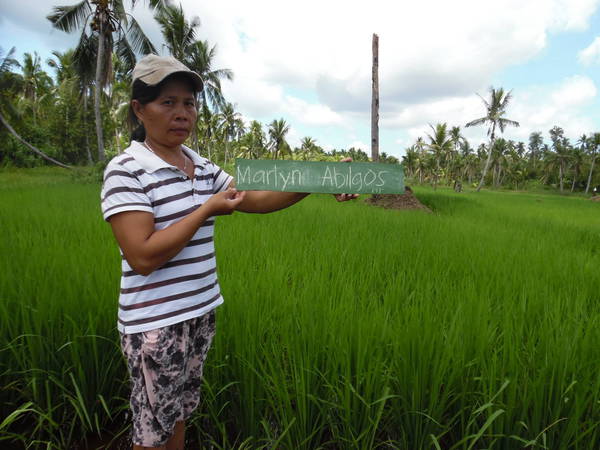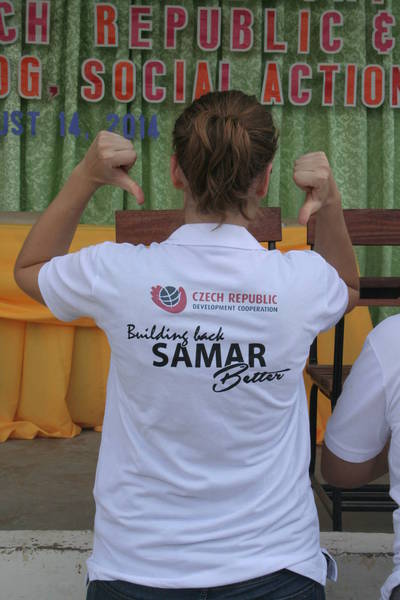Says Kelly Schut, a Caritas Czech Republic representative who arrived in the Philippines in January 2014. Three years ago she was working on charity projects in Indonesia. In the autumn of 2013 she returned to the Netherlands, her mother country. After typhoon Haiyan afflicted the Philippines, Caritas Czech Republic was looking for project manager to work there. Kelly accepted the post and departed for the Philippines. In following interview she describes her experience and charity work on Samar Island.
What was your first impression when you arrived in The Philippines?
 I have been working for Caritas Czech Republic for almost four years. I have started work in the Indonesian province of Aceh. There were people afflicted by natural disasters like people in the Philippines last year. There was a tsunami in 2004. It destroyed houses and income sources and forced people leave their homes, a lot of Indonesian lost those closest to them. Serious tragedy... I arrived in Aceh in 2011, approximately six years after the tsunami.
I have been working for Caritas Czech Republic for almost four years. I have started work in the Indonesian province of Aceh. There were people afflicted by natural disasters like people in the Philippines last year. There was a tsunami in 2004. It destroyed houses and income sources and forced people leave their homes, a lot of Indonesian lost those closest to them. Serious tragedy... I arrived in Aceh in 2011, approximately six years after the tsunami.
The majority of non-governmental organizations had already left the country. New firmer houses built by these organizations were dispersed across the province. Also roads were built anew and (new) possibilities of subsistence appeared. Obviously memories of the tsunami were still vivid. People were talking permanently about it. Caritas Czech Republic workers, clients and receivers of aid, government representatives and local authorities… everywhere I was hearing sad stories and saw tsunami debris – shipwrecks abandoned ashore, grass-grown farm fields, empty fishing ponds.
I arrived in the Philippines in January 2014, almost three months after typhoon Haiyan. It sounds strange, but a lot of reports and stories which I heard about Aceh province were clear to me now. During my first weeks, I went around Tacloban and was surprised by views. Whole families lived in tents at an evacuation camp where they had problems with water access and were trying to return back into their lives.
I had the chance to spend three months at the Caritas Philippines/NASSA headquarters. From there, immediate charity aid financed by international organization Caritas Internationalis including Caritas Czech Republic was coordinated. By the medium of diocese net and volunteers‘ work, NASSA managed to supply afflicted families with shelters, food packages and basic household equipment.
You have been in the Philippines for almost a year now. How would you describe the progress of aid to people who were afflicted by Haiyan?
In June I moved from Cebu city to the Basey municipality. Basey is one of the heavy afflicted municipalities in the Samar province. Caritas Czech Republic contracted a partnership with local Diocese social services centre. It has been a very interesting experience for me. I live on the third floor of a school without water access. Nevertheless, it puts me in close contact with the people that we help and with the project partner as well. Since November 2013, we have accomplished a lot but, we need to continue. There is a need to solve problems with searching for a place to new building-up, land ownership matters and work coordination of all involved sides.
What has Caritas Czech Republic done in the Philippines?
Since beginning Caritas subjoin Caritas International activities. Caritas Czech Republic furnished immediate financial aid. I worked in the NASSA office in Cebu for three months. The Caritas Czech Republic finance manager came from Indonesia to stay for six weeks and help colleagues of NASSA prepare a document called The Crisis Proclamation (summary of what needs to be done including time and money requirements. After consultation with NASSA, Caritas contracted a partnership with Diocese social services centre in Calbayog in May 2014. After that we jointly supported three schools in the Basey municipality with school furniture and equipment which the typhoon destroyed.
In June 2014 the project CROPS: Community Recovery of Principal Agriculture Systems began. The project helps rice farmers and women to obtain income sources by the medium of cultivating fields and gardens. Diocese centre supplied and distributed seeds, tools and heavy machinery such as tractors and weeding machines. An important part of the project is supporting the creation of a farmer´s association and sustainable agricultural education. „We want to support local farmers so they will be able to reach back their standards after Yolanda“, says Diocese centre director father Cesar.
How can we help farmers adapt to climate change and prepare them for catastrophic hazards by the medium of sustainable agriculture introduction? Diocese centre supports various agriculture with remove dependence on one crop for time when catastrophe strikes. It supports „season lasting training“ thus training starting at the time of bedding out and ending at the time of sale. The Czech Development Agency and Caritas Romania also supported this project.
What else is Caritas Czech Republic doing?
 Besides Diocese centre in Calbayog we work in east Samar, tangibly in Balangiga municipality where our partner Caritas Germany is located. The aid focuses on support subsistence projects as well as ecological agriculture. The project helps farmers in Balangiga ensure organic compost. We support their local association called Big Grace Association which builds organic fertilizer factories and which will train farmers on using fertilizer.
Besides Diocese centre in Calbayog we work in east Samar, tangibly in Balangiga municipality where our partner Caritas Germany is located. The aid focuses on support subsistence projects as well as ecological agriculture. The project helps farmers in Balangiga ensure organic compost. We support their local association called Big Grace Association which builds organic fertilizer factories and which will train farmers on using fertilizer.
Anymore I would like to mention that we supported Caritas Switzerland activities in north Cebu where we cooperate with local partner SNAF. We help resident families grow crops suitable to sell, e. g. calamondin (also known as „sour orange“) and turmeric. We also get through farmers, markets and sales representatives.
What is your opinion on the perception of aid from Caritas of local people and partners?
Caritas Czech Republic is one of many donors which are trying to put forward support to typhoon afflicted areas and local people. Generally, the presence of many non-profit organizations in the Philippines is considered as major aid. However, as international unity we have a duty to not change the local system. It concerns more likely about coordination and search for sustainable initiatives. As a member of Caritas Internationalis net Caritas Czech Republic has the chance to share experiences and learn from each other.
When do you think Caritas Czech Republic can leave the Philippines?
We are obligated to continue supporting villages and residents here in Samar now. We are preparing together with Diocese centre in Calbayog a one year project with working title „Various ecological agriculture systems“. In company with other partners we have interest in supporting farmers in east Samar too, but an accurate time horizon is hard to estimate.







